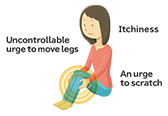Restless Legs Syndrome FAQ
If symptoms are interfering with your daily life, you should visit a doctor as soon as possible.
Some people may feel that because symptoms can be improved by moving their legs, it is something that they should just put up with. However, if it is having a negative effect on daily life, it is important to see a doctor as soon as possible.
For example, if you are losing concentration during the day due to a lack of sleep at night, if you are feeling depressed, or if you avoid taking extended journeys in a car, train or plane because sitting for long periods has become unbearable, you should have yourself checked. Just enduring the discomfort can be a big loss not only for the patient, but also for society.
You might be experiencing augmentation.
When taking medication to replenish dopamine (such as L-dopa or dopamine agonists) for an extended period of time, you may observe that the initial benefits disappear, and the symptoms become more severe. This is called augmentation.
Examples:
- Symptoms appear earlier in the day compared to before the start of treatment
- Symptoms are felt in a larger area of the body
- Symptoms are stronger than before the start of treatment
If augmentation is suspected, your doctor can adjust the dosage to achieve the proper treatment level, or may discontinue the medication. Be sure to consult with your doctor, and do not adjust the dosage or frequency of the medication yourself.
It is possible that restless legs syndrome is genetic.
Although the causes of RLS are not clear, heredity is believed to be a factor in many cases. In fact, with identical twins, if one twin develops RLS, the chance of the other twin also developing it is high. As many as 40% to 90% of RLS patients have people with the same condition in their family. People develop RLS early on are seven times more likely than the average person to have a first-degree relative with the same disease. Three genes associated with RLS have already been identified.






